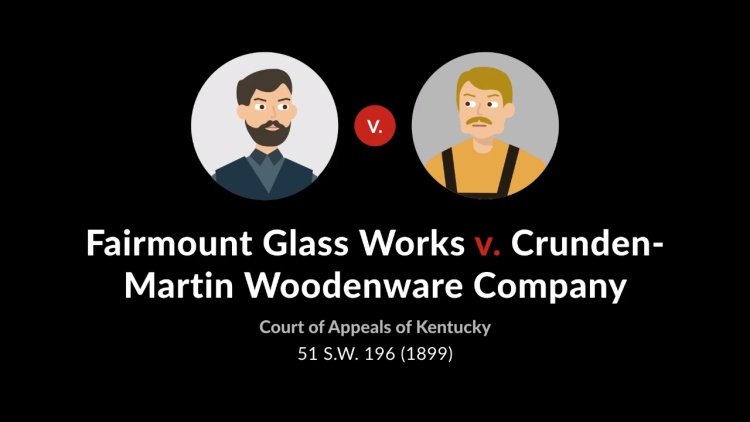Fairmount Glass Works v. Crunden-Martin Woodenware Co.
Court of Appeals of Kentucky
106 Ky. 659, 51 S.W. 196 (1899)

- Written by Christine Hilgeman, JD
Facts
On April 20, 1895, Crunden-Martin Woodenware Company (Crunden-Martin) (plaintiff) wrote to Fairmount Glass Works (Fairmount) (defendant) asking for the lowest price at which Fairmount would sell ten car loads of Mason jars. On April 23, 1895, Fairmount sent a letter with a “quote” of prices “for immediate acceptance.” The next day, April 24, 1895, Crunden-Martin sent a telegram asking that the order be entered as specified in the quotation. Fairmount responded that same day stating that the order could not be filled. Crunden-Martin sued Fairmount alleging that a binding contract had been formed when Crunden-Martin sent the telegram accepting the prices in Fairmount’s April 23, 1895 letter. Fairmount argued in defense that a binding contract had not been formed by Crunden-Martin’s April 24, 1895 telegram, and consequently Fairmount had the right to decline to fill the order. The trial court entered judgment for Crunden-Martin, and Fairmount appealed.
Rule of Law
Issue
Holding and Reasoning (Hobson, J.)
What to do next…
Here's why 907,000 law students have relied on our case briefs:
- Written by law professors and practitioners, not other law students. 47,100 briefs, keyed to 996 casebooks. Top-notch customer support.
- The right amount of information, includes the facts, issues, rule of law, holding and reasoning, and any concurrences and dissents.
- Access in your classes, works on your mobile and tablet. Massive library of related video lessons and high quality multiple-choice questions.
- Easy to use, uniform format for every case brief. Written in plain English, not in legalese. Our briefs summarize and simplify; they don’t just repeat the court’s language.





